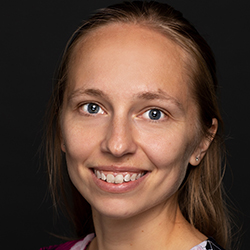Julia Gaudio Receives Prestigious NSF CAREER Award
Award backs research into inference and reconstruction problems on networks
Northwestern Engineering’s Julia Gaudio has received a Faculty Early Career Development Program (CAREER) award from the National Science Foundation (NSF), the foundation’s most prestigious honor for junior faculty members.

Gaudio, assistant professor of industrial engineering and (by courtesy) computer science at the McCormick School of Engineering, will receive $647,173 over five years from NSF’s Division of Computing and Communication Foundations. The work dovetails with the efforts of IEMS, which innovates in the science of data-driven decision making in complex and uncertain environments through algorithms, computation, and mathematical modeling, providing decision-support tools through data science, optimization, simulation, logistics, and financial engineering.
The award supports early career development of individuals who exemplify the role of teacher-scholar through outstanding research, excellent education, and the integration of education and research. Gaudio will write a manuscript which compiles techniques for the theoretical analysis of networks, including some that originate in her own research group.
Gaudio’s work focuses on high-dimensional probability with an emphasis on network inference and network reconstruction problems, an interdisciplinary field involving researchers in computer science, operations research, statistics, applied mathematics, and statistical physics.
With her CAREER award, titled “Discovering Hidden Structure in Networks: Algorithms and Barriers,” Gaudio will study several directions aimed at advancing foundational contributions to inference and reconstruction problems on networks. Foundational research on network inference is aligned with one of the NSF 10 Big Ideas: Harnessing the Data Revolution, with the goal of developing fundamental tools in data science, to benefit from large-scale data, and to train a data-literate workforce.
“The data revolution has brought with it historically unprecedented volumes of high-dimensional data, much of it in the form of networks,” Gaudio said. “Across scientific disciplines, there is a pressing need to develop foundational tools for processing high-dimensional network data and making inferences.”
Gaudio will explore three key research areas to advance foundational tools for network inference and reconstruction. First, she will study community detection in spatial networks, developing models that incorporate spatial dimensions to better reflect real-world transitive behaviors. Second, she will examine the power of optimization algorithms, such as semidefinite and quadratic programming, to determine their effectiveness and limits in network inference tasks like community detection and graph matching. Finally, Gaudio will tackle network reconstruction challenges, including assembling networks from fragmented data, and recovering planted subgraphs. These efforts aim to address critical questions in data science and enhance methodologies for analyzing large-scale networks.
Gaudio has partnered with the Kohl Children's Museum of Greater Chicago to develop exhibits and programming for young children and will further engage with the public through the media.